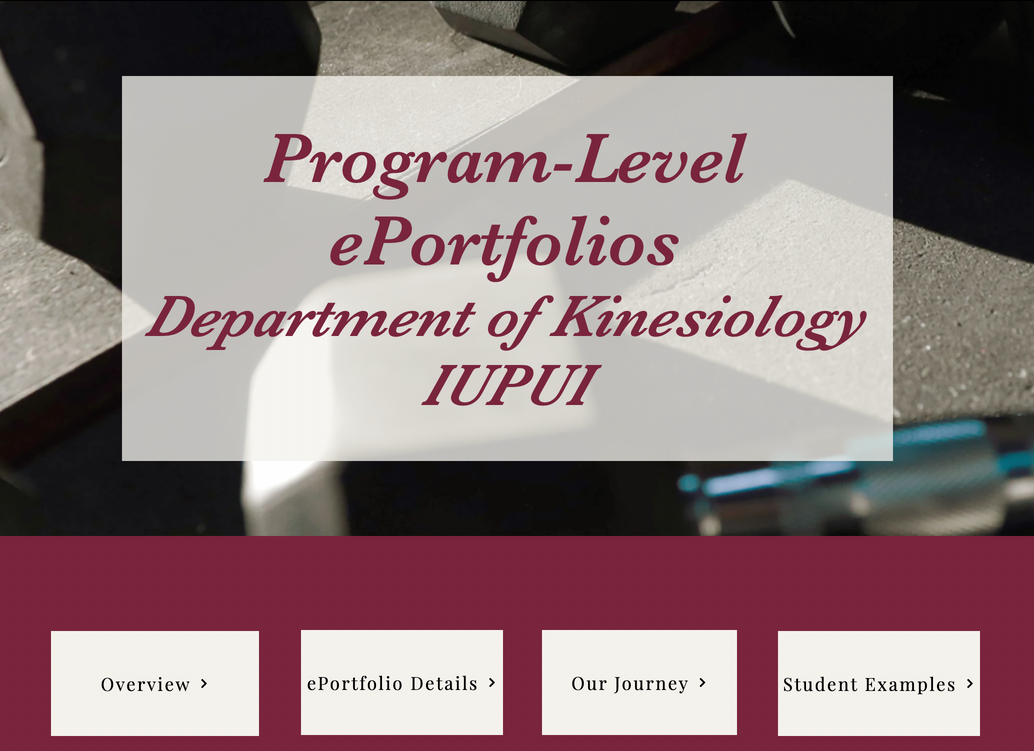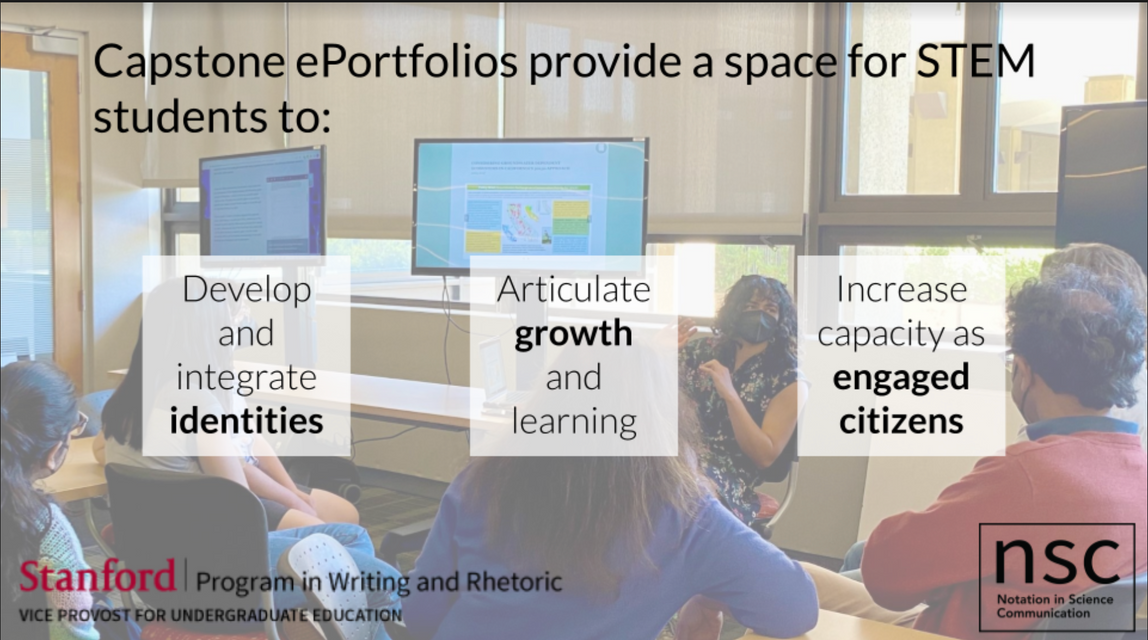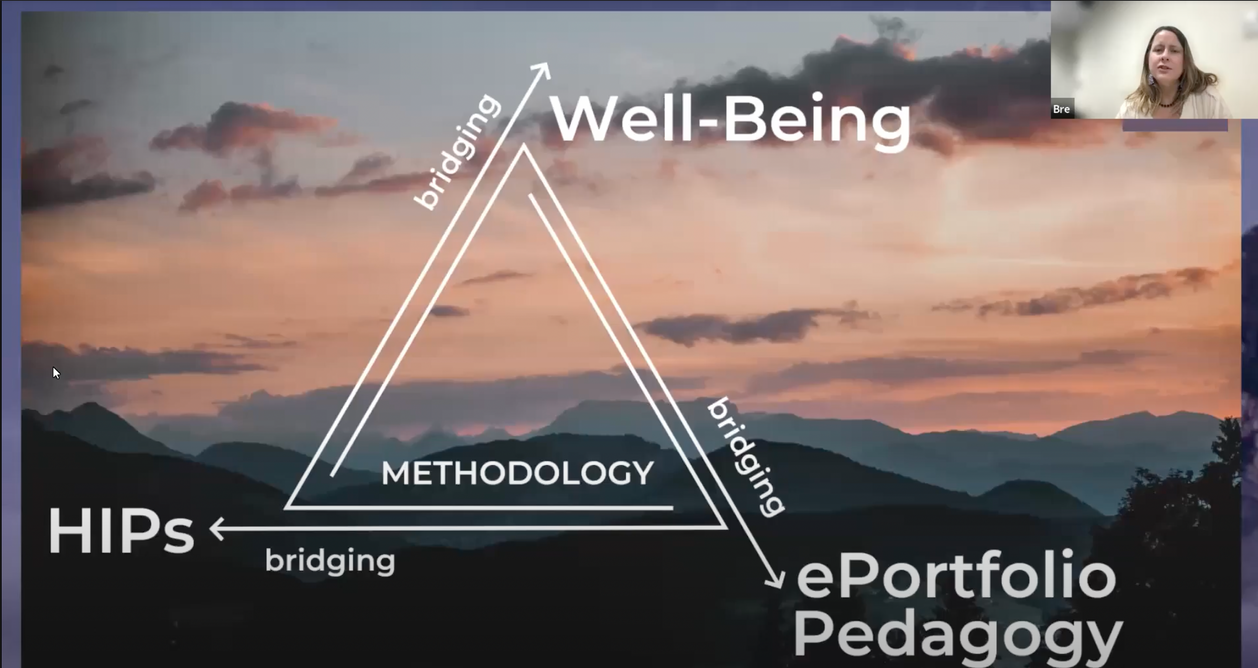Across the Disciplines
Special Issue, Fall 2023
ePortfolios in the Disciplines


Overview
In this special issue, we (re)consider ePortfolios as a form of meaningful, digital teaching and learning in writing across the curriculum (WAC)/writing in the disciplines (WID). Specifically, we seek contributions that advance evidence-based ePortfolio pedagogies and support equitable, engaged learning, authentic assessment, and reflective practice in the disciplines.
Below, we provide early insight into each of the papers with short overviews and additional resources.
The Value of Purposeful Design: A Case Study of an ePortfolio Reflective Prompt
Kathleen Blake Yancey
How are ePortfolio-based meaningful reflections created, and what kinds of meaning do students make in response to such questions? These questions guided our work in designing new reflective questions for an internship ePortfolio completed by students in our Editing, Writing, and Media major. We decided on five progressively oriented questions addressing three periods of time—past, current, and future—and three learning spaces--(1) prior learning occurring in coursework; (2) learning in the internship itself; and (3) learning taking place in the spaces between both. A content analysis of a set of ten ePortfolio reflective texts responding to the new prompt demonstrates that this reflective frame provides the necessary structure and space for meaning-making as students draw from their internships: about what students know, what they can do, what they understand—and how they plan to go forward.
Key Words:
Reflective Prompt, Reflective Frame, Internship, Meaning-making
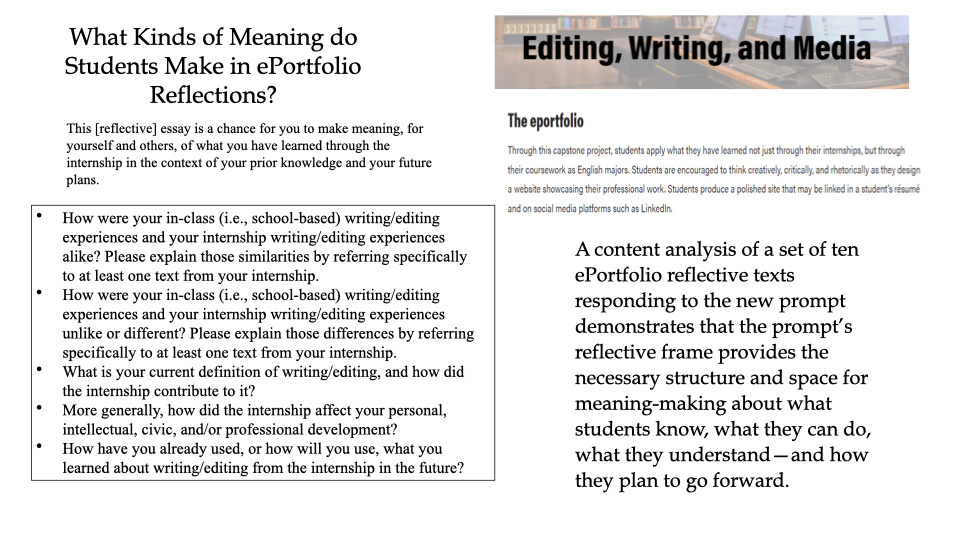
High-Impact Practices and Third Spaces:
Connecting Across the Disciplines
Morgan Gresham, Megan Mize, Sarah Zurhellen
In this chapter, we argue that the labor-intensive nature of effective HIPs often necessitates the expertise and support of individuals in a growing class of academics that operate outside the traditional academic hierarchy.
We consider how these third space professionals develop discursive strategies which allow them to work across disciplines. In particular, we examine the AAEEBL Digital Ethics Task Force as a discourse community consisting of both third space professionals and those in more traditional academic roles. We also share preliminary data from the ePortfolio Mapping Project, highlighting trends in ePortfolio practitioners' labor. Finally, we consider how such trends impact ePortfolio initiatives that foster multimodal and reflective composition practices across disciplines.
Key Words:
Third Space, Ethics, Labor
Striving toward inclusive excellence: A 6-year retrospective of ePortfolio implementation
Mark Urtel, Stephen M. Fallowfield, Lisa Angermeier, and Rachel Swinford
Acknowledging then implementing ePortfolios as a High Impact Practice across an academic program presents many opportunities and challenges. The authors document their 6-year journey, and lessons along the way, as they strive for best practices.
This faculty team took a sabbatical from their first attempt at implementing. They then immersed themselves in comprehensive professional development and worked together with their students in recasting how each knew and understood an ePortfolio. In order to achieve the newly crafted outcomes of an ePortfolio project the authors found that promoting student voice and choice is essential to fostering student engagement and inclusivity.
Key Words:
Best Practices, Inclusivity, Professional Development, Student Voice
Visit Our Site
Science communication across the disciplines: Reflecting on STEM identities through Capstone ePortfolios
Christine Alfano, Emily Polk, and Jennifer Stonaker
In this article, we share the results of our analysis of capstone ePortfolios from our undergraduate science communication program. We situate student work within the framework of our curriculum, with attention to pedagogical approaches that promote student agency and deeper engagement with reflection. We share key findings: how students use ePortfolios to develop and integrate personal and professional identities; to articulate their growth and development as science communicators and disciplinary experts; and to increase their capacity and awareness of what it means to be an engaged citizen, that is, how they can make an impact on the world.
Key Words:
Capstone, Science Communication, Identity
ePortfolio Composition: Fostering A Pedagogy of Well-Being Through Cross-Disciplinary Bricolage
Bre Garrett, Kylie Pugh, and Amanda Wallace
In a two-year cross-disciplinary pilot study, examining over 700 ePortfolios, a recurrent trend emerged that raised attention to the socio-psychological dimension ePortfolios have on student learning and development. In this article, we extrapolate a pedagogy of well-being. Our programmatic research advances dialogue about how ePortfolios repurpose authentic assessment of student learning over time. Our research anchors ePortfolios as bricolage composing spaces that curate physical, mental, and emotional well-being. We highlight the radical reinvention happening at the student, instructional, and cultural level as we take our traditional projects and allow our students to rediscover, “what are HIPs?”
Key Words:
Well-Being,
Evidence-Based, Authentic Assessment
Content Analysis of Nursing Students’ ePortfolio Reflections and Navigational Design Choices: A Qualitative Study
Deb Kramlich and Jen Gennaco
Implementation of ePortfolio in the School of Nursing and Population Health at the University of New England provides both Accelerated Bachelor of Science in Nursing (ABSN) and Bachelor of Science in Nursing (BSN) students with similar instruction at a similar point in their programs. Prior to this study, we believed that ABSNs would have embraced ePortfolio differently given their work experience and their maturity as students, having already completed an undergraduate degree. Study results demonstrated this was not the case, finding more similarities than differences in their reflective practice and ePortfolio content curation. Both groups added the majority of the required ePortfolio content and demonstrated a variety of reflective practices. The implementation of ePortfolio in Nursing provided the potential for authentic audience beyond individual classes, thus moving toward ePortfolio as a high-impact practice that makes student learning visible and develops reflective practice. Our ePortfolio process has not yet yielded highly individualized student ePortfolios but has resulted in students regularly adding content and improving their reflective practice to demonstrate their learning. Our addition of ePortfolio into the Nursing curriculum provides a medium that is more than just a digital repository, but students are not yet invested in being independent ePortfolio makers. Students constructed their ePortfolios to include some skills across Nursing courses, but neither BSN nor ABSN students recognized that their prior experiences or course work may demonstrate a transfer of skills to Nursing course work. Although our study does not indicate that our fledgling ePortfolio program is integrative yet, it has provided a foundation as we aspire toward ePortfolio practice done well.
Key Words:
ePortfolio Curation, Nursing, Reflective Practice, Authentic Audience
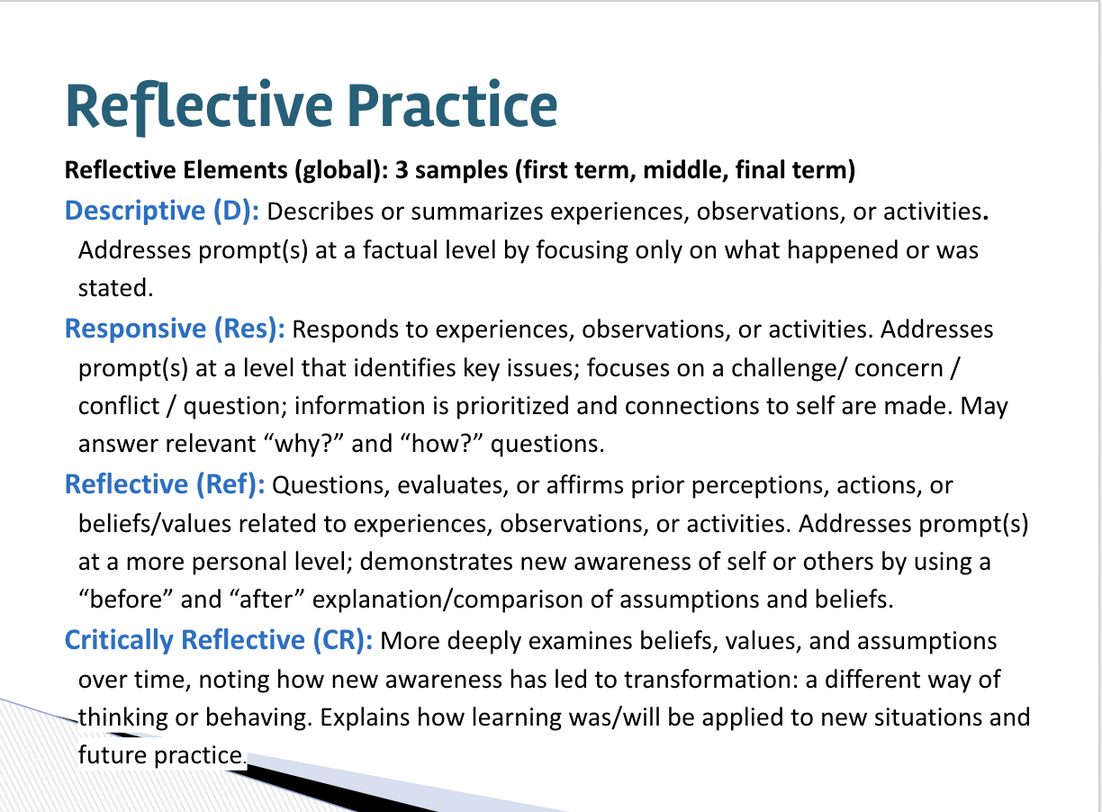
Image 1: Categories of reflective practice based on previous work by Deb Kramlich and Lori Rand, Writing Specialist at University of New England
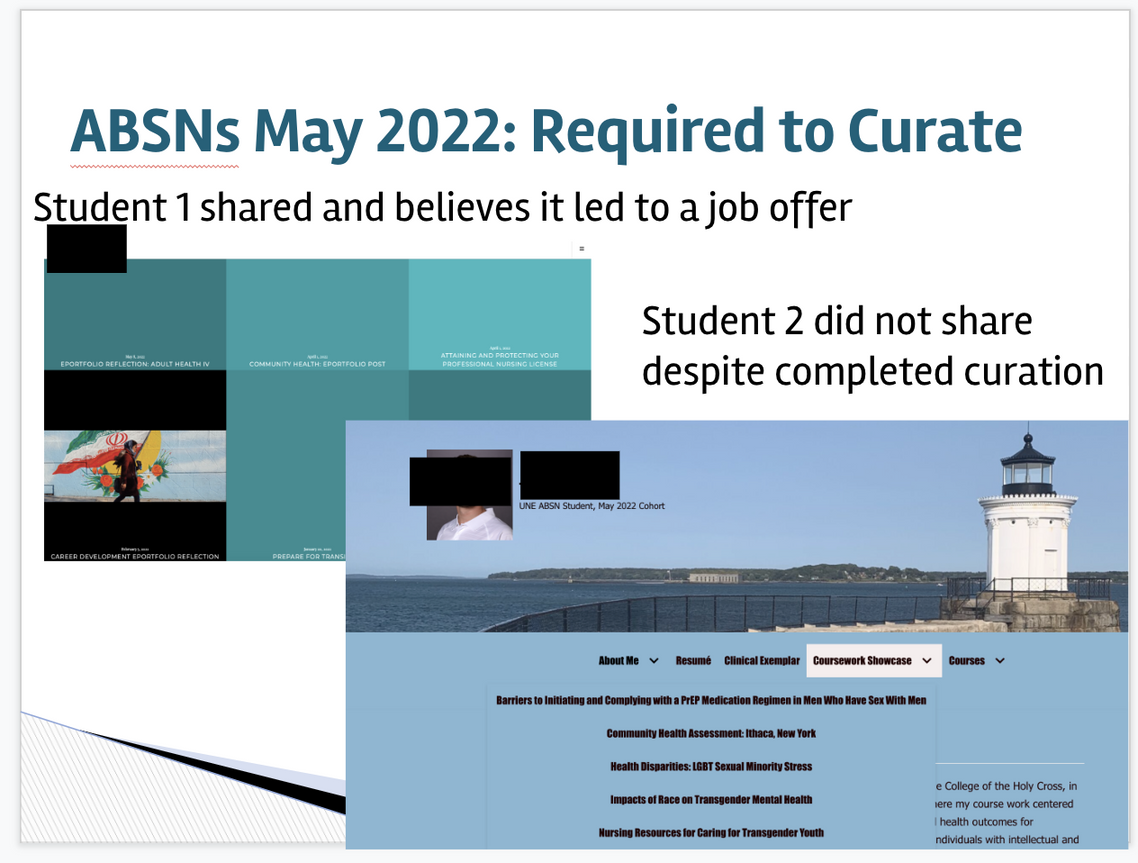
Image 2: Samples of curated ePortfolios with different themes and different navigational methods
Get in touch
hlchen@stanford.edu, acicchina@erau.edu,
crb0085@auburn.edu
Would you like to be notified when this special edition is available?


